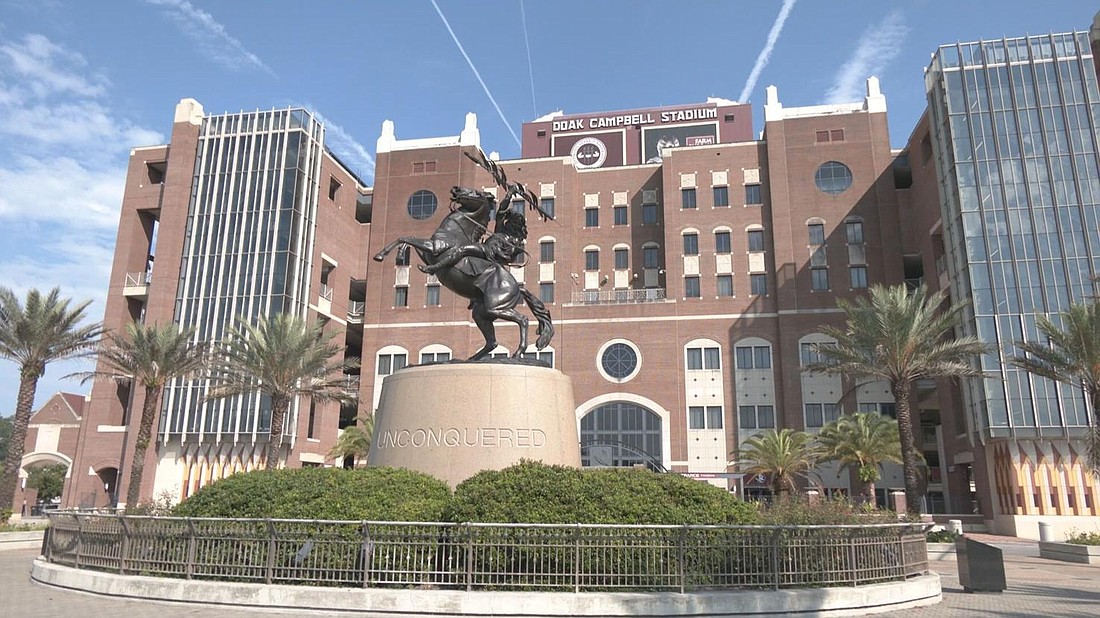- December 15, 2025

TALLAHASSEE — Attorney General Ashley Moody on Thursday amped up a legal battle between Florida State University and the Atlantic Coast Conference, filing a lawsuit accusing the conference of violating the state’s public-records laws by refusing to hand over media-rights contracts that are a critical element of the dispute.
Florida State and the ACC have been fighting in court for months on two fronts: FSU’s home turf in Tallahassee and in North Carolina, where the conference is headquartered. Amid major conference realignments in college athletics, the cases are drawing intense scrutiny.
Florida State’s lawsuit, filed Dec. 22 in Leon County circuit court, alleges the university would face in excess of $500 million in penalties to exit the conference. That lawsuit came a day after the conference filed a case in Mecklenburg County, N.C., against FSU about many of the same issues.
The clashes hinge, in part, on ACC’s contract with ESPN, Inc. and ESPN Enterprises, Inc., originally signed in 2010. Through the contract, the conference collects media revenues and distributes money to member schools to support their athletic programs.
A 2013 “grant of rights” agreement “irrevocably transferred” the schools’ media rights to home games to the ACC, in exchange for a collective media-rights contract with ESPN, according to court records. The grant-of-rights agreement was modified in 2016 and lasts until 2036.
Moody in January sent a letter to the ACC seeking a number of documents related to the dispute, including the grant-of-rights agreement and the conference’s contract with ESPN. The ACC’s response to Moody said that some of the records she requested, including the grant-of-rights agreement, were already available publicly — but the contract with ESPN was off-limits.
Moody’s lawsuit filed Thursday in Leon County argues that, under Florida’s broad open-records law, the contracts should not be shielded from scrutiny.
Documents “are public records even if prepared and maintained by a private organization if they were ‘received’ by agents of a public agency and used in connection with public business,” Chief Deputy Attorney General John Guard wrote in the 13-page legal complaint.
“The contracts are a public record because Florida State University (FSU) examines and uses the media rights contracts in the transaction of the agency's official business. The contracts are also the product of delegated authority by FSU to the ACC,” Guard added.
In a Jan. 19 response to Moody’s request for documents, ACC General Counsel Pearlynn Houck wrote that contracts between ESPN and the conference are “commercial agreements between two non-governmental entities” and should not be considered public records.
“These are not contracts between Florida State and the conference, and therefore are not contracts between a public body and a private entity,” Houck wrote.
Also, Houck argued that the documents are protected because they contain “commercially sensitive and proprietary information which, if publicly disclosed, would irreparably harm the conference's and ESPN's ability to negotiate future rights agreements.” The agreements require the conference and ESPN to “take all steps to preserve and protect the confidentiality of these agreements and bar their disclosure to third parties,” Houck added.
But the state’s lawsuit disputes that the records are shielded.
“A public record cannot be transformed into a private record merely because an agent of the government has promised that it will be kept private,” Guard wrote. “Nor is it material that the ACC had an expectation that the documents would remain private.”
The ACC “has disclosed and discussed portions of the media rights contracts, and has not, and cannot, exercise control over other public records of FSU relating to the same subject matter,” he added.
The lawsuit also said that “because the ACC has failed to provide a single word of the media rights contracts, the issue of whether any portion of the contracts are protected by trade secrets … is for another day.”
Houck’s letter noted that the agreements allow the member schools to inspect the contracts “so long as the terms of confidentiality are imposed.” The contracts can be viewed in person at the ACC’s headquarters in Charlotte, Houck added.
“As you are aware, Florida State asked for access to these agreements to inspect them on multiple occasions and on each occasion it was made clear to Florida State (and in some instances its outside counsel), that a condition of access was confidentiality. Florida State agreed to those restrictions. No member has been provided with a copy of these agreements; all members are required to review these agreements at the conference's headquarters in North Carolina,” Houck wrote.
In an interview with The News Service of Florida this week, Moody lambasted the ACC for refusing to turn over documents.
“It is incredibly astounding that the media agreements would not be given to the state of Florida when the ACC is demanding over half a billion dollars from one of our entities,” she said.
Moody on April 17 asked her counterparts in six states that are home to other ACC schools to join her efforts to support Florida State.
Moody sent a letter to attorneys general in California, South Carolina, Kentucky, Georgia, Pennsylvania and Virginia outlining a ruling by Louis Bledsoe, chief business court judge in Mecklenburg County, that denied Florida State’s motion to stay the lawsuit filed in North Carolina by the ACC. The school has filed a notice of appeal of Bledsoe’s decision.
Meanwhile, Leon County Circuit Judge John Cooper this week gave Florida State more time to amend its lawsuit against the conference.
Lawyers for the ACC had asked Cooper to dismiss the case, arguing that the lawsuit amounted to a “contract dispute” between the school and the conference.
The ACC also argued that FSU failed to flesh out whether the legal complaint could be brought in Florida.
Cooper on Monday agreed, but said FSU could have more time to address the “personal jurisdiction” issue. The judge gave FSU 10 days to file an amended complaint.